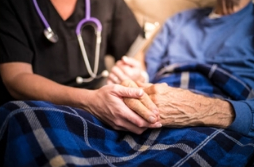
Fee
CE Hours
Activity Type
- Certificate Program (formerly practice-based)
Target Audience(s)
- Pharmacists
Accreditation(s)

|
St. Louis College of Pharmacy at the University of Health Sciences and Pharmacy in St. Louis is accredited by the Accreditation Council for Pharmacy Education as a provider of continuing pharmacy education. To learn more about the specific program information, including universal activity numbers (UAN's) and learning objectives, please expand the modules below. Following successful completion of an evaluation, CE credit will be automatically reported to NABP through the CPE Monitor system, using the NABP ePID numbers and date of birth (MMDD) stored in participants' user profiles. Follow this link to learn more about CPE Monitor and the credit reporting process » Participants are responsible for ensuring receipt of credit; no credit can be corrected or awarded if more than 60 days have passed from the date of the event or if the home study is expired.
It is the policy of St. Louis College of Pharmacy at the University of Health Sciences and Pharmacy in St. Louis, to ensure balance, independence, objectivity and scientific rigor in all its educational programs. All faculty participating in this program are expected to disclose to the program audience any real or apparent conflicts of interest related to the content of the presentation.
|
Requirements for CE Credit
- Register and complete payment.
- Log in and navigate to this page. If you are not automatically re-directed, visit the home page, log in, and click "My Account" to view current active registrations.
- Watch all 16 videos - they will appear on this page after payment has been verified. You MUST be logged in with a fully registered account.
- Complete the post test (click the green button to complete) and pass with a minimum score of 80%. You may take the test as many times as necessary.
- Complete the practice experience and three required reflection questions. Expect to spend approximately 2 hours completing this portion. You will be expected to email your responses to CE@uhsp.edu; accumulated responses will be evaluated on a monthly basis. Please allow 4-8 weeks for processing and feedback. The specific reflection questions will be available following successful registration and payment—return to this page after registering to view (you must be logged in).
- Complete the evaluation (make sure you are logged in and have already completed and passed the post test). All responses are stored anonymously.
Objectives
- Discuss the culture and history of hospice.
- Define hospice and palliative care, with specific attention to areas of overlap and difference.
- Identify common admission diagnoses and demographics for patients receiving palliative care or hospice services.
- Describe the interdisciplinary team for both hospice and palliative care.
- Describe roles for pharmacists in hospice care including direct patient care, medication order review, and reconciliation, education and medication counseling and administrative roles.
- Describe Medicare guidelines for the most common admitting terminal diagnoses to hospice care.
- Make recommendations to optimize the medication regimen to manage pain and non-pain symptoms, optimal dosage formations, and discontinue medically futile medications.
- Describe best practices in transitions in care from an acute care facility to home-based hospice in terms of medication management.
- Describe risks and benefits of commonly used administration routes at the end of life.
- Differentiate pharmacokinetic and pharmacodynamic differences in medications administered via alternative administration modalities.
- Discuss the benefits of deprescribing in hospice.
- Describe the ethical issues related to the process of health care decision making and informed consent (e.g., MOLST/POLST forms, advance directives, code status orders, health care proxy decision making).
- Identify key symptoms of diagnoses common to patients in hospice and palliative care.
- Recommend treatment of various symptoms including: nausea / vomiting, constipation, malignant bowel obstruction, and diarrhea at the end of life.
- Recommend treatment of various symptoms including: hiccups, anorexia/cachexia, dysphagia, dyspepsia, end-stage renal disease, uremia, mucositis, oral care, and related symptoms at the end of life.
- Discuss hospice eligibility criteria for heart failure and COPD.
- Identify pharmacologic and non-pharmacologic strategies to maximize symptom management in a patient with end-stage heart failure or COPD.
- Assess a treatment plan for distressing end of life care symptoms associated with dementia, Parkinson’s disease, and stroke.
- Recommend an appropriate treatment regimen for psychiatric symptoms, such as anxiety, depression, insomnia, and delirium.
- Recommend treatment at the end of life for various symptoms including: anemias, cytopenias, thrombosis, wound care, and fungating tumors.
- Analyze current practice to identify needs for patients requiring hospice and palliative care.
- Develop a plan for applying the information in the modules to improve practice for the care of patients in hospice and palliative care.
Speaker(s)/Author(s)
|
Alexandra McPherson, Pharm.D., MPH Brief Bio : Dr. Alexandra McPherson recently completed her PGY-2 Pain and Palliative Care Residency at the University of Maryland School of Pharmacy, and accepted a position with the inpatient palliative care consult service at MedStar Washington Hospital Center in Washington, D.C. Dr. McPherson has published and presented nationally on topics pertaining to pain management and palliative care, and is an active member of AAHPM, SPCP, MPhA and MSHP. Her academic interests include early integration of palliative care in advanced illness, navigating transitions of care at the end-of-life, community-based palliative care, and palliative care in developing countries. Her newest interest involves the integration of narrative medicine practices as a tool for reducing burnout and improving resiliency among palliative care providers. |
|
|
Amanda Daniels, Pharm.D.
Brief Bio : Amanda Daniels graduated from Southern Illinois University Edwardsville School of Pharmacy in 2016. She then went on to complete a PGY1 Pharmacy Practice Residency at HSHS St. Elizabeth’s Hospital and a PGY2 Pain Management and Palliative Care Residency with Hospice of Southern Illinois. Upon completion of residency, she will be working as a pain management and palliative care clinical pharmacy specialist at HSHS St. Elizabeth’s Hospital. |
|
|
Ashley Merritt, Pharm.D., AE-C
Brief Bio : Ashley Merritt Pharm.D., AE-C currently serves as a Clinical Pharmacy Specialist with the Robert Silvey VA Clinic in Farmington, Missouri. She grew up on a small horse & cattle ranch in the area, returning home to expand ambulatory clinical pharmacy services. |
|
|
Chris Herndon, PharmD, CPE, FASHP Brief Bio : Chris Herndon, PharmD, CPE, FASHP is a Professor with the Southern Illinois University Edwardsville (SIUE) School of Pharmacy. Currently, Dr. Herndon sees chronic pain patients in a multidisciplinary setting within a family medicine residency clinic. Dr. Herndon’s scholarship interest focuses primarily on pain and palliative care education and he is the Principal Investigator for the National Institutes of Health Center of Excellence in Pain Education at SIUE. Dr. Herndon is the president-elect for the Society of Palliative Care Pharmacists. He is the 2006 recipient of the “Pain Champion Award” from the Alliance of State Pain Initiatives, the 2012 recipient of the “Academic Pain Educator of the Year Award” from the American Society of Pain Educators, the 2016 “Pharmacist of the Year” from the Illinois Pharmacist’s Association, and the 2018 recipient of the Distinguished Service Award from the American Pain Society. |
|
|
Justin Garret Kullgren, Pharm.D. Brief Bio : As a Clinical Pharmacy Specialist at The Ohio State University Wexner Medical Center James Cancer Hospital , Justin consults with nurses, physicians, and other palliative interdisciplinary team members on pain and symptom management, prevention and treatment of adverse drug events, medication dosing, and monitoring and disease state management. Dr. Kullgren has substantial experience developing curriculum and instructing on a variety of topics and to a variety of audiences. Justin teaches in academia and has provided numerous education presentations to nurses, nurse practitioners, oncology trainees, pharmacists, and physicians. |
|
|
Kathryn Walker, Pharm.D., BCPS, CPE
Brief Bio : Kathryn Anne Walker, Pharm.D., BCPS, CPE is the Senior Clinical and Scientific Director for Palliative Care for MedStar Health System. She is charged with developing clinical outcomes, research and education along with developing the palliative clinical services at the ten hospitals and in the outpatient community of MedStar Health. She also serves as an Associate Professor at the University of Maryland School of Pharmacy where she contributes to both didactic and experiential pharmacy education. Dr. Walker’s passion for safe and appropriate medication use includes a major focus on relief of suffering and drives her efforts in clinical practice, research and education. |
|
|
Mary Lynn McPherson, Pharm.D., MA, MDE, BCPS Brief Bio : Dr. Mary Lynn McPherson is a Professor and Executive Director, Advanced Post-Graduate Education in Palliative Care at the University of Maryland School of Pharmacy. She is also the Program Director of the Online Master of Science and Graduate Certificate Program in Palliative Care offered by the University of Maryland, Baltimore. Dr. McPherson has practiced in hospice and palliative care her entire career, publishes extensively in this area, and is a frequent presenter at the local, state, national and international level on appropriate medication use in serious illness. |
|
|
Stephanie Abel, Pharm.D., BCPS Brief Bio : Stephanie Abel is a Clinical Pharmacy Specialist in Palliative Medicine at The Ohio State University Wexner Medical Center – James Cancer Hospital. She rotates between the inpatient palliative medicine consult service and the benign hematology service. She received her PharmD from Creighton University in Omaha, Nebraska after which she completed a PGY-1 in Pharmacy Practice at The Medical University of South Carolina in Charleston, SC and a PGY-2 in Pain Management and Palliative Care at The Johns Hopkins Hospital in Baltimore, MD. |
Activity Number
0033-0000-22-006-H01-P
